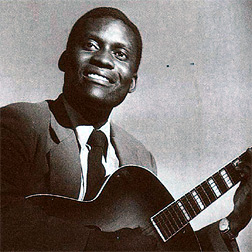Alick Nkhata: Difference between revisions
Chalochatu (talk | contribs) No edit summary |
Chalochatu (talk | contribs) No edit summary |
||
| Line 2: | Line 2: | ||
'''Alick Nkhata''' (1922–1978) was a popular [[Zambia]]n musician and broadcaster in the 1950s through to the mid-1970s. Nkhata, Zambian Broadcasting Service’s director, formed the Lusaka Radio Band, which was later called the Big Gold Six Band. The band promoted Zambian music, translating original rural recordings into Westernized scored music.<ref>[http://allafrica.com/stories/200709120140.html Southern Africa: Nkhata's Contribution to Zimbabwean Music Significant]; The Herald (Harare) 2007-09-12</ref> | '''Alick Nkhata''' (1922–1978) was a popular [[Zambia]]n musician and broadcaster in the 1950s through to the mid-1970s. Nkhata, Zambian Broadcasting Service’s director, formed the Lusaka Radio Band, which was later called the Big Gold Six Band. The band promoted Zambian music, translating original rural recordings into Westernized scored music.<ref>[http://allafrica.com/stories/200709120140.html Southern Africa: Nkhata's Contribution to Zimbabwean Music Significant]; The Herald (Harare) 2007-09-12</ref> | ||
==Early life and education== | |||
Alick was born in 1922 in the [[Kasama|Kasama District]] to a [[Tonga]] father and [[Bemba]] mother whose characteristics were later reflected in his art. He trained as a school teacher but when World War II broke out he enlisted with the East African Division and served in Burma. | |||
==Music career== | |||
After demobilisation, he began working with the celebrated musicologist High Tracey, with whom Alick toured the region recording African musicians. He went on to join the Central African Broadcasting Service as an announcer-translator, who also claimed he could 'sing a bit'. The first song on this collection was the most popular of all his songs, but all of them combined traditional and contemporary idioms, elements of town and country, past and present, and of tribal and detribalised society. As Michael Kittermaster, formerly head of broadcasting in Zambia recalled 'The man was true original, who mirrored in his songs something that transcended the barriers of tribe, race and language.'<ref name="retro">[http://www.retroafric.com/html/sl_notes/04cd_3.html RetroAfric, Love songs and other 1950s hits]</ref> | |||
== See also == | == See also == | ||
[[Music of Zambia]] | [[Music of Zambia]] | ||
| Line 16: | Line 21: | ||
[[Category:Zambian musicians]] | [[Category:Zambian musicians]] | ||
[[Category:Zambian male singers]] | [[Category:Zambian male singers]] | ||
Revision as of 20:38, 7 June 2016
Alick Nkhata (1922–1978) was a popular Zambian musician and broadcaster in the 1950s through to the mid-1970s. Nkhata, Zambian Broadcasting Service’s director, formed the Lusaka Radio Band, which was later called the Big Gold Six Band. The band promoted Zambian music, translating original rural recordings into Westernized scored music.[1]
Early life and education
Alick was born in 1922 in the Kasama District to a Tonga father and Bemba mother whose characteristics were later reflected in his art. He trained as a school teacher but when World War II broke out he enlisted with the East African Division and served in Burma.
Music career
After demobilisation, he began working with the celebrated musicologist High Tracey, with whom Alick toured the region recording African musicians. He went on to join the Central African Broadcasting Service as an announcer-translator, who also claimed he could 'sing a bit'. The first song on this collection was the most popular of all his songs, but all of them combined traditional and contemporary idioms, elements of town and country, past and present, and of tribal and detribalised society. As Michael Kittermaster, formerly head of broadcasting in Zambia recalled 'The man was true original, who mirrored in his songs something that transcended the barriers of tribe, race and language.'[2]
See also
External links
References
<templatestyles src="Reflist/styles.css" />
- ↑ Southern Africa: Nkhata's Contribution to Zimbabwean Music Significant; The Herald (Harare) 2007-09-12
- ↑ RetroAfric, Love songs and other 1950s hits
